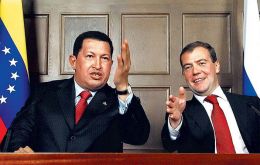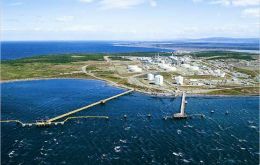MercoPress. South Atlantic News Agency
Latin America
-
Friday, July 25th 2008 - 21:00 UTC
Environmentalists' concern with Chilean leg of Dakar rally

Chilean environmentalists and public figures this week expressed concern about potential environmental threats posed by the Dakar off-roading rally, scheduled to be held in Chile and Argentina in January.
-
Thursday, July 24th 2008 - 21:00 UTC
BHP Billiton makes huge copper discovery in Chile

Anglo-Australian BHP Billiton has made a big discovery near its Escondida copper mine in Chile and has announced plans to spend 327 million US dollars to shore up the resource and two others nearby as it looks to extend the life at the world's biggest copper mine.
-
Wednesday, July 23rd 2008 - 21:00 UTC
Venezuela offers Russia strategic alliance against US

Venezuelan president Hugo Chavez has called for a strategic alliance with Russia to protect his country from United States. Chavez call came as Moscow and Caracas agreed to extend bilateral co-operation on energy.
-
Wednesday, July 23rd 2008 - 21:00 UTC
Chile joins Latam whale and dolphin watching tourism

Whales and dolphins are making the tourism market boom, particularly in Chile, where tourism is becoming a key factor of Chile's economic development strategy. More than one million tourists enjoyed viewing cetacean species in Latin America this past year, industry sources report.
-
Wednesday, July 23rd 2008 - 21:00 UTC
Gas from coal to fuel methanol plant in extreme south Chile

Canada's Methanex, the world's main producer of methanol, is planning to convert coal into natural gas to supply its huge complex in the extreme south of Chile which has been working below capacity precisely because of insufficient gas, said the corporation's CEO Bruce Aitken.
-
Tuesday, July 22nd 2008 - 21:00 UTC
FARC rejects peace talks and promises to fight on

Two leaders from Colombian rebel group FARC said they will continue to use violence to achieve their aims. The statement by the Revolutionary Armed Forces of Colombia commanders defies calls from presidents in the region to disarm and give up the fight.
-
Tuesday, July 22nd 2008 - 21:00 UTC
Massive investment in Magallanes region gas exploration

Chile's government owned oil and gas company ENAP is planning to invest over 300 million US dollars in the next three years to develop natural gas deposits in Magallanes Region, in the extreme south of the country.
-
Monday, July 21st 2008 - 21:00 UTC
Uribe clears the ground for a possible third mandate

Colombian President Alvaro Uribe has scrapped his plan to rerun the 2006 election in which he won re-election, the government announced, a move that could set the stage for him to seek a third term in 2010.
-
Monday, July 21st 2008 - 21:00 UTC
Patagonia's massive dam project protest reaches Spain

Greenpeace activists on Monday morning brought their concerns over a controversial Spain's Endesa HidroAysen dam project in Chilean Patagonia directly to the company's doorstep, scaling its headquarters building in Madrid, draping an attention-grabbing, several-story-high protest banner, reports Patagonia Times.
-
Monday, July 21st 2008 - 21:00 UTC
Castro promises idle land to farmers to boost food production

Cuban President Raul Castro announced the redistribution of government land that is not in use to private farmers to stimulate food production and efficient farming. Cuba in spite of abundant farm land must import half of its food.
